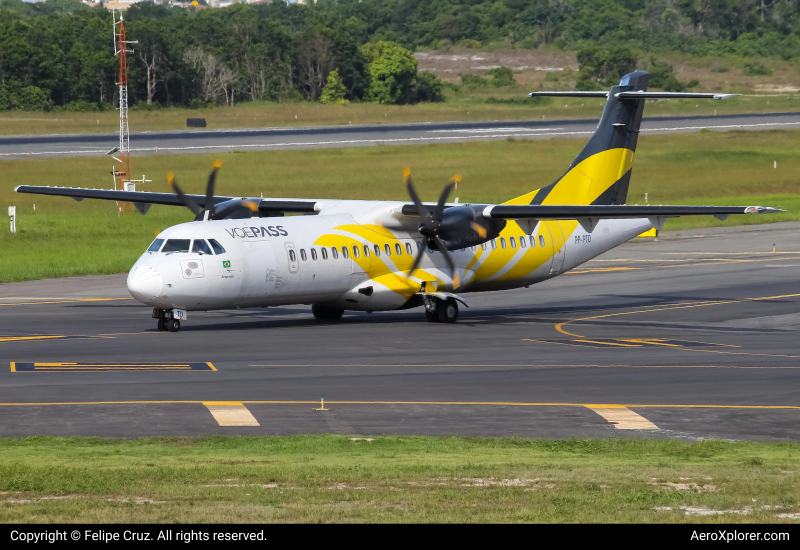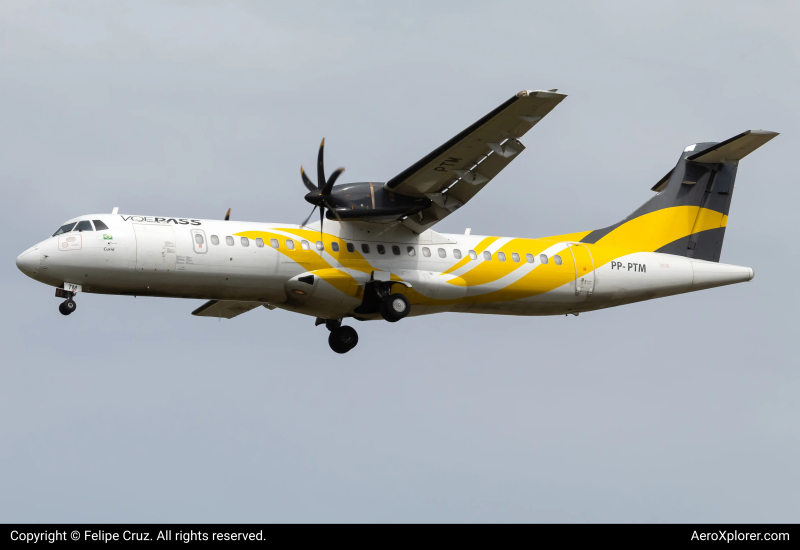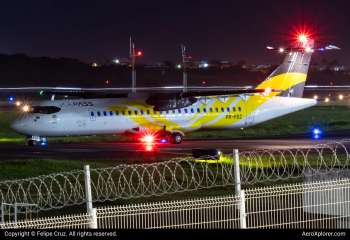Shocking details have emerged in the wake of Voepass Flight 2283's horrifying crash on Friday, August 9th. While the flight's investigation is ongoing, new details reveal that the same aircraft had suffered another incident earlier this year.

Grounded
The aircraft operating the ill-fated Flight 2283 was a 14-year-old ATR72 registered PS-VPB.
On March 11th, 2024, this aircraft was operating Flight 2290, a domestic service from Recife (REC) to Salvador (SSA). While en route, the crew received a "low hydraulic quantity" indication.
Following this, the flight continued to Salvador and landed safely. However, once the ATR72 touched down on Runway 10, the plane suffered a tail strike preventing it from continuing service.
PS-VPB remained on the ground in Salvador for over two weeks following the incident. It was then ferried to Voepass' maintenance facilities in Ribeirão Preto and remained there until July 9th.
CENIPA, Brazil's entity that investigates aircraft incidents, categorized the March 11th incident as "minor" and there was no detailed investigation into it.

However, some Brazilian media claimed to have seen the maintenance logs for PS-VPB that noted serious structural damage following the tail strike. This would explain why the plane was grounded for almost three and a half additional months.
More Issues
PS-VPB returned to service on July 9th. However, the aircraft lost cabin pressure on its first flight back from maintenance. This prompted the ATR to once again be grounded but this time for four days.
As of July 13th, the plane once again began operating regular flights. This streak would tragically end with the demise of Flight 2290 as it was nearing São Paulo.
Furthermore, passengers who flew this aircraft in recent history leading up to the crash noted that it was always incredibly hot onboard. It seemed that the air condition system never worked properly, unlike other aircraft in the Voepass fleet.

Given these details, it is easy to draw connections and say that PS-VPB's prior incidents played a significant role in its tragic demise.
However, the investigation of Flight 2283 is ongoing. Preliminary reports have suggested that the aircraft suffered severe icing leading to various control systems being compromised. However, there is no official confirmation of this.
The details regarding PS-VPB's troubled past are undoubtedly important and will be closely scrutinized in the Flight 2283 investigation.
Comments (0)
Add Your Comment
SHARE
TAGS
NEWS voepassatr72voepass flight 2283air crash brazil brazil plane crash voepass crashRECENTLY PUBLISHED
 Learjet Owned By Vince Neil Crashes Into Gulfstream Jet, 1 Fatality Confirmed
On February 10th, around 14:30 local time, a Learjet private jet aircraft crashed into another private jet after landing at Scottsdale Airport (SCF) in Arizona.
NEWS
READ MORE »
Learjet Owned By Vince Neil Crashes Into Gulfstream Jet, 1 Fatality Confirmed
On February 10th, around 14:30 local time, a Learjet private jet aircraft crashed into another private jet after landing at Scottsdale Airport (SCF) in Arizona.
NEWS
READ MORE »
 Seattle Plane Strike 2025: Japan Airlines and Delta Collision Raises Safety Concerns
Seattle-Tacoma International Airport saw a concerning incident on Wednesday morning when a Japan Airlines (JAL) plane clipped a parked Delta Air Lines jet while taxiing. Thankfully, no one was injured, but passengers described the collision as a frightening experience.
NEWS
READ MORE »
Seattle Plane Strike 2025: Japan Airlines and Delta Collision Raises Safety Concerns
Seattle-Tacoma International Airport saw a concerning incident on Wednesday morning when a Japan Airlines (JAL) plane clipped a parked Delta Air Lines jet while taxiing. Thankfully, no one was injured, but passengers described the collision as a frightening experience.
NEWS
READ MORE »
 Ethiopian Airlines Expands Cargo Fleet with New Boeing 777 Freighter
Ethiopian Airlines has expanded its cargo fleet with a brand-new Boeing 777 Freighter, registered as ET-BAB (MSN 68140). The aircraft was delivered directly from Boeing’s factory in Everett, Washington, USA, and landed at Addis Ababa Bole International Airport at 3:41 PM (GMT+3) on Wednesday, January 22, 2025.
NEWS
READ MORE »
Ethiopian Airlines Expands Cargo Fleet with New Boeing 777 Freighter
Ethiopian Airlines has expanded its cargo fleet with a brand-new Boeing 777 Freighter, registered as ET-BAB (MSN 68140). The aircraft was delivered directly from Boeing’s factory in Everett, Washington, USA, and landed at Addis Ababa Bole International Airport at 3:41 PM (GMT+3) on Wednesday, January 22, 2025.
NEWS
READ MORE »





